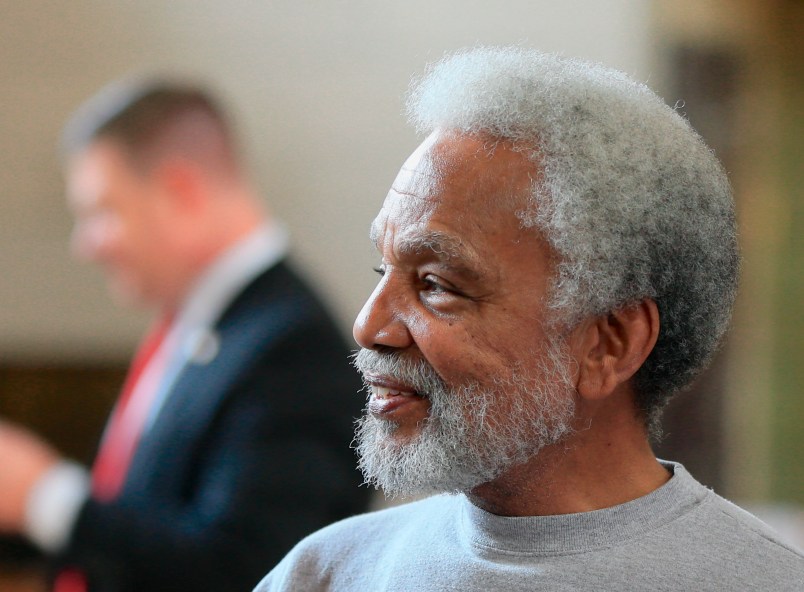Before sharing a few thoughts of my own, let me just tell you there’s a fascinating TPM Reader email below on what led to the news today out of Nebraska. It’s really must read.
I mentioned earlier this afternoon that Nebraska’s unicameral legislature today passed a bill abolishing the state’s death penalty. Technically, it’s not law yet. The governor says he’ll veto it. But the vote margin is more than enough to sustain a veto. So it seems next to certain that Nebraska will in fact abolish the death penalty – and become the first conservative state to do so in the modern death penalty era.
I was a bit chagrined because I didn’t even know this was under consideration. So what happened exactly? Nebraska isn’t Alabama. But it’s a pretty conservative state. I asked one of our readers – the one who first wrote in to let us know what happened – just what the backstory was. Why now? Why this state? How exactly did this happen?
This was the answer I got back (lightly edited to remove a few personally identifying details)
Well, the backstory is long. First, you would have to know Senator Ernie Chambers. He has been pushing at this heavy door for decades. And failed time after time. He was term limited. After he waited out his time out of office, he was reelected and started it all up again. For a long time, the only African-American state senator, and representative of predominantly poor, African-American section of Omaha, he is ruthless, brilliant, and so politically adept at tying the Legislature in knots, that he can be a veto in of himself. But, he says outrageous stuff. He can be a bit of a separatist. When he came back this second time to the Legislature, a friend took him aside and made some suggestions. He is brilliant, but aging. He needs to mentor. Pass his knowledge on. And by doing that, he inspired. He made friends. More friends among his colleagues than perhaps he had before.
The second prong of this is that over the summer, the legislature did a widespread study on prison reform. This was prompted by a luridly publicized case of Nikko Jenkins, who had told state prison officials while he was still incarcerated that he was mentally ill, needed services, or he would kill upon release. He did not get mental services, and lo and behold went on a killing spree upon release. One of the controversies surrounding his case, was that it appeared prison officials may have released him too early. The investigation led to the revelation that Republican conservative appointees in the Corrections department were purposely ignoring the law and releasing prisoners early. And lying about it. The reason why is because we are over capacity to the point the feds will intervene. We cannot afford another prison. Period. In the face of all the mandatory minimum sentences and the get tough on crime increasing penalties, population inside the prison boomed. So…. Corrections officials released by purposely miscalculating credits against time, and fudged the number of actual incarcerated people.
No matter which party, lawmakers don’t like being lied to here. This resulted in legislation being introduced to fix overcrowding. They did it by trying to get rid of mandatory minimum sentencing and by changing sentencing to prioritize incarceration for violent crimes, and making supervised release the default for drug and property offenses. These are Republicans doing it. The bottom line for them was, we cannot afford to keep going the way we are going. That created a momentum of its own, to start reassessing the whole philosophy behind incarceration and punishment. The reaction from the prosecutors in the face of all this reform was to completely oppose any reform, and this year kept simply testifying in opposition, without any suggestions for change. This ticked off a number of Republican lawmakers who found the prosecutors’ stance less and less credible. So when it came to opposition to the death penalty, let’s just say that while once treated deferentially, the prosecutors word on things is no longer gospel.
And third, it comes down to money. We haven’t executed anyone since 1997. We can’t get the drugs for lethal injection. There isn’t any way a firing squad bill will pass, because opposition against the death penalty is just strong enough not to get it passed. So we have those already sentenced sit on death row, and the State has no means of killing them. That is expensive. There is a separate housing unit for death row inmates, with separate guards etc.. There are endless appeals. Saving money appeals to conservatives.
This is a case where the unicameral system, which is at least officially nonpartisan, made things work. There is no second house. There are only 49 lawmakers. They know each other. We do have liberals in the cities. They appealed to the conservatives whose Catholicism teaches the death penalty is not pro life, or who if not Catholic, could not justify the expense any longer.
All of the above created a perfect moment, which fell into place. We are all a bit stunned, somber, grateful and relieved.
(As an aside, the prison reform bill has passed, but again is being threatened by veto. There may or may not be enough votes to override a veto on that. That has no effect on the death penalty bill).






